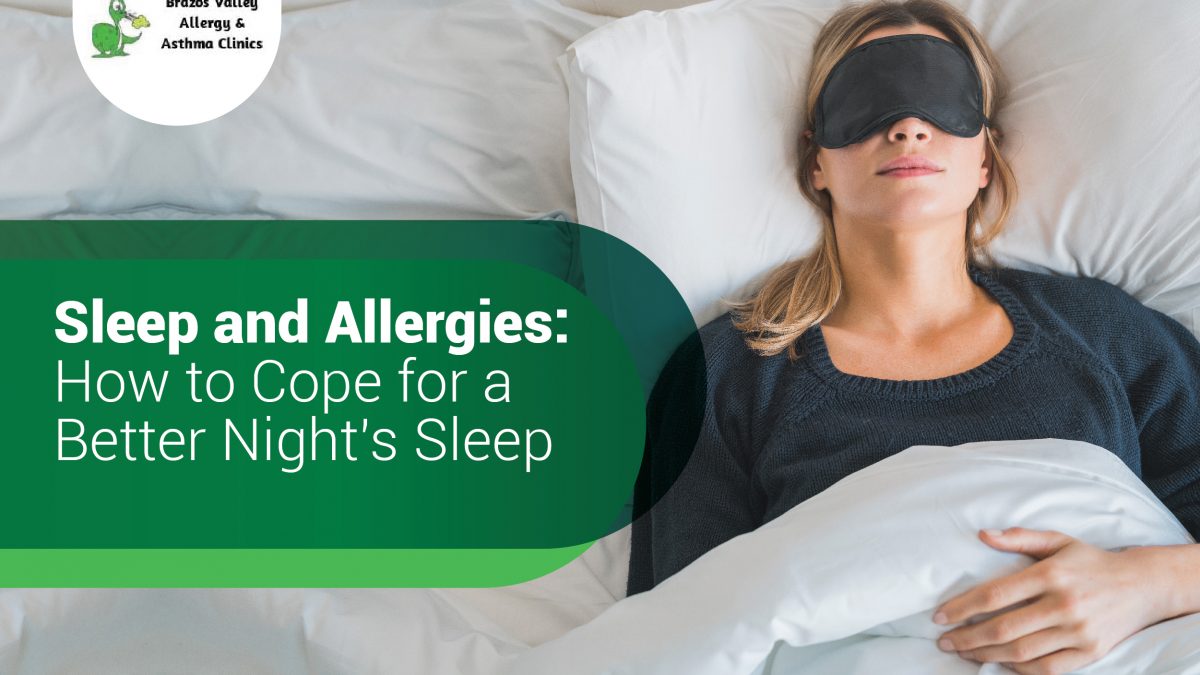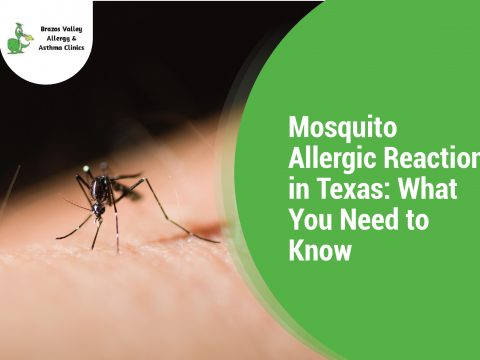- 979-485-9287
- office@bvallergy.com
-
 979-251-7804
979-251-7804
Sleep and Allergies: How to Cope for a Better Night’s Sleep

It’s Spring! What Allergens to Look Out For
February 15, 2022
Foods That Fight Allergies
March 21, 2022Have you ever experienced waking up in the middle of the night with a runny nose and uncontrolled sneezing? If you have, you might be affected by nighttime allergies. Research says that forty percent of Americans experience signs and symptoms of allergic rhinitis.
People living with allergies are at a higher risk of developing insomnia. So, we decided to create a post to help you deal with allergies and sleep issues. We’ll talk about how to get rid of allergies, their causes and provide helpful tips to help you get the revitalizing sleep you deserve. If you suffer from sleep deprivation due to allergic reactions, this article is for you.
Allergies at Night: How It Affects Sleep
When your allergies keep you up at night, chances are, your health may be at risk. Your body’s reaction to anxiety and stress intensifies, making it harder for you to go back to sleep. Getting poor sleeping habits often leave you feeling drained and irritated the following day.
Allergens can irritate your nasal passages once they enter your nose. This triggers allergic reactions such as sneezing, watery eyes, and a stuffy nose. It can be very uncomfortable when these symptoms occur at night, especially when you’re trying to get sleep.
Mild Sleep Disturbances Caused By Allergies
Individuals suffering from allergic rhinitis often develop mild sleeping disorders. Here’s a few examples we’ve compiled.
- Difficulty in staying asleep
- Elevated Snoring
- Non-restorative sleep
- Shortened sleeping times
Allergies and sleep issues do not end for these people during the day. In addition to fatigue, these people suffer from headaches and sinus infections. As a result, their daily performance and concentration are affected.
Serious Sleeping Disturbances
When mild sleeping issues are not addressed, they can become a bigger problem. Here’s a list of severe sleep disturbances that people with allergies may develop.
- Bedwetting
- Insomnia
- Increased snoring
- Obstructive sleep apnea (OSA)
Developing Obstructive Sleep Apnea (OSA) may be the worst thing that could happen to people with allergies. OSA potentially increases the risks of heart failure, hypertension, and difficulty losing weight.
Causes of Household Allergies
We’ve collected the top 5 causes of nighttime allergies at home. If you’re getting frequent allergic reactions, you may want to learn about these five causes so you can avoid them.
- Dust Mites. These microscopic creatures live in your pillows, blankets, or mattresses. They are attracted to exfoliated human skin. Although they don’t bite, they trigger allergic reactions.
- Pets. Pet danders trigger allergic reactions in humans. Their furs, feathers, or skin may contain allergens that cause allergic reactions.
- Cigarette Smoke. Smoking pollutes the air causing allergic reactions. It’s also the same with firewood.
- Household Cleaning Chemicals. Some sanitizing chemicals for your home emit a strong odor. The particles from these chemicals are hazardous to people with allergies.
- Molds and Mildews. Smelling the odors from molds and mildews may trigger an allergic reaction. They often grow unnoticed, especially in dark corners of the room.
How to Sleep With Allergies
It’s difficult for people with allergies to find quality sleep. The symptoms are indeed uncomfortable and annoying. Try these eight helpful tips to achieve undisturbed and rejuvenating sleep.
Buy an Air Purifier
Treating allergies is more than just taking some allergy medicine every now and then. It also includes looking at the environment you’re in to make sure that you’re not being exposed to any of the common allergens that are around you. The quality of the air in your home can have a profound effect on your health. Air purifiers filter and clear the air from dust mites and pet danders, molds, mildews, and pollen from outside the house.
Keep Your Doors and Windows Closed
Close your doors and windows to keep allergens from entering your house. It’s an easy task to accomplish but, be vigilant in keeping it observed. Keep in mind that pollens are unseen by the naked eye. Leaving your doors and windows open might let these particles in unnoticed.
Observe Cleanliness
Keep your furniture dust-free whenever you can. Dust particles cause allergic reactions to everyone, including people that don’t have allergies. Use a face mask while cleaning to reduce the risks of triggering an allergy attack. Avoid stuff that collects dust like carpets, stuffed toys, and fabric curtains.
Keep Your Room Off-Limits to Pets
If you let them inside your bedroom, you can never prevent your pets from leaving pet dander. Animals like dogs and cats often shed their furs. Try to keep them away from your bedroom as much as possible.
Manage Your Laundry Appropriately
Going outside during pollen season makes your clothes a magnet for allergens. Put your clothes in an enclosed laundry basket when you get home to avoid exposure to allergens. Or better yet, wash your clothes immediately.
Shower Before Bedtime
A shower before you turn in for the night may provide the extra boost you need to get a good night’s sleep. Moreover, it eliminates the pollen attached to your body. Research has also found that showering before sleeping helps to reduce allergy symptoms such as stuffy nose, watery eyes, sneezing and itching.
Take Your Allergy Medication Before Sleeping
Allergy medication typically induces drowsiness. Antihistamines keep your allergic reaction at bay, and they help you sleep better.
Here are the most common medicines used to treat and manage allergies.
- Antihistamines. Health professionals have used these drugs to treat allergies with a high efficacy rate. Antihistamines come in many shapes and sizes. They can be in the form of pills, nasal sprays, or IVs.
- Decongestants. Your nose tissues typically swell during an allergic reaction. Decongestants reduce the swelling to relieve the symptoms of a stuffy nose. You can take these drugs with antihistamines safely.
Talk to Your Allergist
Having regular consultations with your doctor should be your top priority if you have allergies. They can provide you with the appropriate treatment methods for your condition. OTC medicines are safe, but a doctor’s recommendation is superior.
Sleep Better with the Help of Brazos Valley Allergy & Asthma Clinics
Our allergists are the most sought-after in College Station and Brazos Valley. We provide the best treatment for all kinds of allergies, including rhinitis, contact dermatitis, and seasonal allergies. All our medical procedures start with the safest allergy tests to ensure the efficacy of our treatment. If you want to manage your allergies and sleep better, give us a quick call today!




